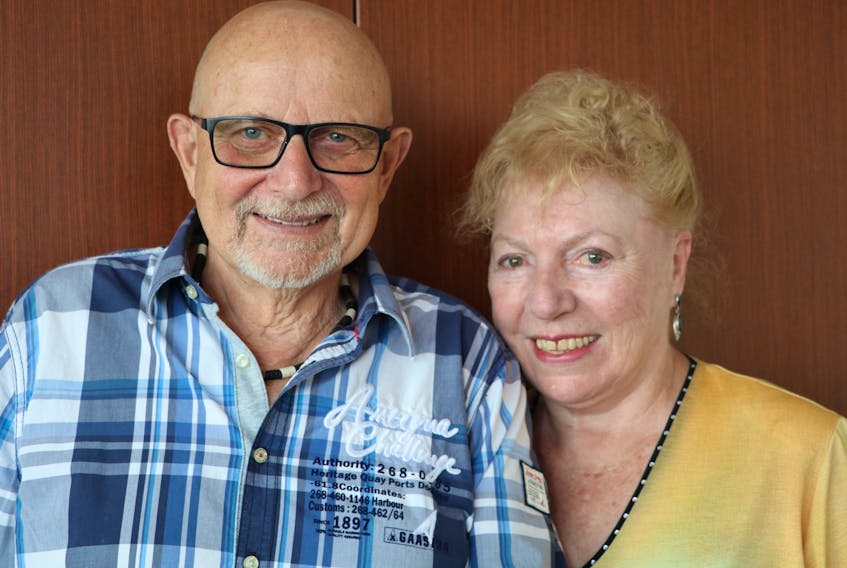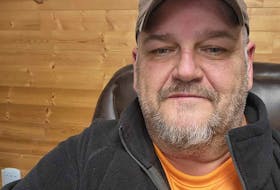
When the Berlin Wall fell in November 1989, an emotional Wolfgang Jorn sat on the edge of his couch in his newly adopted home in Canada to watch the news coverage.
It was something he never thought would happen in his lifetime.
Less than two years earlier, with suspicious Stasi officers sniffing at his heels, Jorn and his then girlfriend fled the freedom-restricting life of East Germany and carefully carried through on a secret plan to defect to Canada.
During a flight from Cuba — one of the few places they were allowed to vacation at the time — headed back to East Germany, they made their move when the plane touched down in Gander for refueling.
“When we got to the transit area I told my girlfriend to find the first person in uniform,” Jorn, 73, said on Friday in St. John’s, his first time back to the province in 30 years.
“I couldn’t speak English and the only words she knew was ’save me’.
“When I tried to follow her, the officers directed me back thinking I might be a member of the Stasi, but my girlfriend convinced them I was with her.”
After Germany surrendered to the Allies on May 7, 1945 bringing an end to the European conflict of the Second World War, Germany was occupied and divided into four zones with the United States, Soviet Union, Great Britain and France each being responsible for the administration of a zone.
In September 1949, the German Federal Republic was created out of the American, British and French zones forming a democratic society in West Germany. The Soviets oversaw the creation of the German Democratic Republic (GDR) out of its zone of occupation in October 1949, forming a communist society in East Germany.
In 1961, East Germany built the Berlin Wall that divided the city into east and west. It was meant to keep East German citizens from fleeing to the west.
“I always felt like a bird in a cage,” Jorn said, about growing up and living in East Germany.
“I was one who loved life, and I loved freedom.”
Jorn said not only were there rules on what job you could have or how to behave in public, but for simple things, like a colour television or a refrigerator, you’d have to wait for years.
“When you turned 18 in East Germany, you could go to the car dealer and order your new car and wait 15 years to get your first new car,” he said. “But you could buy a used car right away (that cost more than the new car would).”
Jorn said the Stasi secret service and the police kept a close eye on any citizens they suspected might try to escape the country.
And he came under increased suspicion, he noted, after he and his then wife divorced.
“My wife and my daughter continued to live in the house I built,” he said. “Neighbours and friends were questioned about me, as to whether I had made any indication about wanting to escape.”
Planning his escape was a long process as a number of things had to line up perfectly. First, he said, he had to make his intention known that he wanted to take a vacation in Cuba with his girlfriend. That would take some years to be approved.
The other thing was that the 15-year wait for him to be able to purchase a new car had to be up so he could sell his used car for some money he would need without suspicion.
It was Jan. 8, 1988, when he and his girlfriend sought asylum.
Jorn said he believes he was followed by a Stasi spy during his trip to Cuba as a man kept asking him questions about how someone would go about escaping if they wanted to.
Years after Germany was reunified, Jorn made a request to the new government to see the file the Stasi had on him. In it he found out what he had always thought was true.
Not only did Stasi agents talk to friends and neighbours, but they even obtained his school assignments to see if there was any indication of him at a young age wanting to escape, and they even interviewed the man he sold his car to. There were also notes from the man he suspected was a Stasi spy on the Cuba trip.

After spending his first two weeks in Gander after being granted asylum, Jorn and his girlfriend came to St. John’s to learn English and remained in St. John’s for eight months before moving to Ontario.
It is to reconnect with the people he met and friends he made during that time in St. John’s that brought him and his current wife Doris to the city this week.
Ironically, Doris is from West Germany, and she came to Canada in 1961 for a three-month course to learn English needed for her job in Switzerland. She met her first husband while in Canada and remained. Her husband died seven years later.
She and Jorn later connected over an online dating site and married 13 years ago.
Jorn said life has been good in Canada, and he can’t find the words to say how grateful he is to the country that took him in.
“From that that day when I started learning English here to the first job I got in Kitchener, my life just kept going forward,” he said, building a career in welding and millwright work.
He’s been back to Germany “very often” to see his daughter and granddaughter, and they come to Canada to visit him as well.
Both Jorn and Doris say they have a special place in their hearts for Newfoundland and Labrador.
“You are by far the friendliest, most fun-loving people,” Doris said.
Jorn has a few funny stories about his first months in Canada, particularly in St. John’s.
The first time he answered a telephone at his St. John’s apartment, he said, the person on the other end of the line tried to sell him a $40 carpet cleaning.
“I said, “what is carpet? Is it food? I then asked him to spell it for me so I could look it up in the dictionary.”
Each day while taking the bus to his English lessons, Jorn would notice a particular nice building with many cars outside and the people going in were always very well-dressed. He figured it was a club where dances were held.
One day he decided to go inside to find out when there was another event.
“I went in and a man comes, and he is dressed in a nice suit and asked, ‘Can I help you?’ And I said, ‘yes, can you tell me when is the next dance?’”
The man replied, “Sir, this is a funeral home.”
Later, when Jorn returned to his boarding house, he asked his landlady, “What is a funeral home?”
“She asked me ‘why?’ and I told her I went there as I thought it was a special club and asked when is the next dance?
“She almost peed in her pants laughing.”









